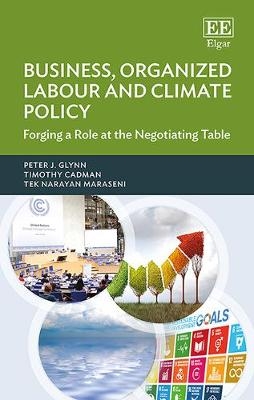
Business, Organized Labour and Climate Policy
Forging a Role at the Negotiating Table
Seiten
2017
Edward Elgar Publishing Ltd (Verlag)
978-1-78643-011-3 (ISBN)
Edward Elgar Publishing Ltd (Verlag)
978-1-78643-011-3 (ISBN)
Business, Organized Labour and Climate Policy examines the current lack of effective action in bridging the gap between climate change goals and governmental policies. With little published about the role of employers' organizations and trade unions in the climate change policy process, this book evaluates their involvement and argues that labour market considerations should be a central element of climate change policy.
The study applies ecological modernization theory as a framework to guide policy development and negotiation. Application of the framework finds that employers' organizations and trade unions are effective civil society advocates, but responding to the labour market implications of climate change is neither institutionally embedded nor prioritized. Included are case studies of climate change policy in six developed and two developing economies, as well as within organizations such as the European Union and the UNFCCC. The emergence of labour issues in formal climate agreements demonstrates the impact that climate change is having on the broader economy and employment, and the need for business and labour to take concrete action.
Providing an invaluable reference for policy development, this work will appeal to academics and students, as well as employers' organizations and trade unions. This book provides a unique perspective on key stakeholding organizations in climate change policy and presents a platform for engaging with government.
The study applies ecological modernization theory as a framework to guide policy development and negotiation. Application of the framework finds that employers' organizations and trade unions are effective civil society advocates, but responding to the labour market implications of climate change is neither institutionally embedded nor prioritized. Included are case studies of climate change policy in six developed and two developing economies, as well as within organizations such as the European Union and the UNFCCC. The emergence of labour issues in formal climate agreements demonstrates the impact that climate change is having on the broader economy and employment, and the need for business and labour to take concrete action.
Providing an invaluable reference for policy development, this work will appeal to academics and students, as well as employers' organizations and trade unions. This book provides a unique perspective on key stakeholding organizations in climate change policy and presents a platform for engaging with government.
Peter J. Glynn, Bond University, Timothy Cadman, Institute for Ethics, Governance and Law, Griffith University and Tek Narayan Maraseni, University of Southern Queensland, Australia
Contents: Introduction: business and labour in climate policy 1. Ecological modernization: theory and the policy process 2. The role of employers’ organizations and trade unions in the climate policy process 3. Climate policy in context I: countries within the EU 4. Climate policy in context II: countries outside the EU 5. Case study: the European Union 6. Case study: United Kingdom 7. Comparative analysis: country profiles and case studies 8. Perspectives on the governance quality of climate policymaking 9. Conclusions Index
| Erscheinungsdatum | 01.02.2018 |
|---|---|
| Verlagsort | Cheltenham |
| Sprache | englisch |
| Maße | 156 x 234 mm |
| Themenwelt | Sonstiges ► Geschenkbücher |
| Naturwissenschaften ► Biologie ► Ökologie / Naturschutz | |
| Sozialwissenschaften ► Politik / Verwaltung ► Staat / Verwaltung | |
| Wirtschaft ► Betriebswirtschaft / Management | |
| ISBN-10 | 1-78643-011-8 / 1786430118 |
| ISBN-13 | 978-1-78643-011-3 / 9781786430113 |
| Zustand | Neuware |
| Haben Sie eine Frage zum Produkt? |
Mehr entdecken
aus dem Bereich
aus dem Bereich
Lehrbuch zu Grundlagen, Technologie und Praxis
Buch | Hardcover (2022)
Hanser (Verlag)
34,99 €


